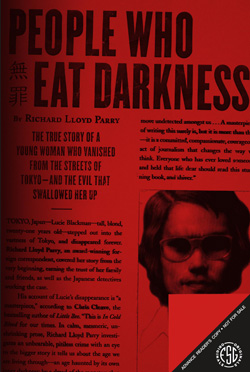Country: U.K/Japan
Genre: Non-Fiction/True Crime
Pages: 445
I had lived in Tokyo for most of my adult life and traveled across Asia and beyond. As a reporter of natural disasters and wars, I had seen something of grief and darkness. But Lucie's story brought me into contact with aspects of human experience that I had never glimpsed before. It was like the key to a trapdoor in a familiar room, a trapdoor concealing secrets - frightening, violent, monstrous existences to which I had been oblivious.
For as long as I can remember, I have watched true crime shows on television. My parents hated it, because it gave me anxiety before bedtime and nightmares, but I never stopped watching them. My fascination for those feels natural. Somehow, soaking up information about the worst criminals who dwell among the living feels like something I should be doing. I've seen reviews of PEOPLE WHO EAT DARKNESS around in the blogosphere, comparing it to classics like IN COLD BLOOD or THE EXECUTIONER'S SONG. Let me tell you right now, these comparisons are extremely unfair, for it is not what you call a "non-fiction novel" like the two others. Richard Lloyd Parry's book reads a lot more like a true crime show. It doesn't bother with the narrative variables that a novel does. It just goes over the facts. But I can see how readers would be compelled to compare PEOPLE WHO EAT DARKNESS with the greatest non-fiction book. It tells a quite fascinating story.
I had never heard of Lucie Blackman before and I'm sure not many of you did. She's a twenty-one years old British girl who vanished from the streets of Tokyo, where she made a living as a club hostess in the Roppongi district. For those unfamiliar with the lore of the Japanese capital *, it's their red light district. The place of all vices. The hostess bar business is something very alien to the Occidental Society and it's a crucial variable in why Lucie Blackman disappeared. Hostesses are hired to flatter the everyday man's ego, for a very high fee. Japanese Salarymen walk in one of these specialized bars and will find a beautiful (often foreign) girl, listening to him, laughing at his jokes and stroking his ego. He can offer her drinks, ask her on a dinner date, but that's it. It's a game that re-enacts the first steps of a date again and again for lonely businessmen. It's something very well understood in Japanese society, but there's always somebody that doesn't want to play by the rules. Somewhere, Lucie just hit the wrong guy.
Here's the thing. PEOPLE WHO EAT DARKNESS was mesmerizing. I literally read it in four sittings, over three days (and it's not a small book). But it's not what its cover reflects. It's not really about the super-creepy guy on the cover. It's not the most interesting part anyway. Really, PEOPLE WHO EAT DARKNESS is about being a foreigner in Tokyo and most important, the bureaucratic nightmare that is loosing somebody you love in this city. It's the story of Tim Blackman's search for his daughter, the roadblocks he encountered and the dead-end leads he followed as much as it is Lucie's. Lead after lead, Tim is walking deeper into the underbelly of Tokyo and finds more and more disturbed aspects about the urban Japanese life. I've read those chapters in an almost-trance. Craftily, Parry puts the Tim Blackman chapters in perspective at the end of the book, but it doesn't take away from the interest. It just makes the character (well, person) so much deeper and complex.
"I didn't feel angry," Tim said. "I just felt as if I was falling into an abyss-no lifeline and no hope. Where were going to find it now, the next bit of hope?"
There is one thing that bugged me about PEOPLE WHO EAT DARKNESS. It's really minor, it's more of a pet peeve than anything. Richard Lloyd Parry stays behind the fact and acts as an omniscient narrator for most of the time, but he seldom steps out and talks in the first person. I thought it was odd because there is no sense of pacing around these intervention. They happen at random. It gave the book a "makeshift" feeling that I thought it didn't need. It is possible to have the author as a part of the narrative, but it has to be throughout the entire book or at least it needs a rhythm. These intervention were beautiful, well-written and they popped my bubble. Minor stuff, really. But I thought I should mention it. It was like that fly hovering over a delicious cake.
In all truth, I haven't read a good, recent true crime that could measure to PEOPLE WHO EAT DARKNESS in a long time. It might not measure up to the classics of the genre, but it's nonetheless a great read. Richard Lloyd Parry drags you under and makes you see Tokyo from an angle you're not supposed to. You will turn the pages with an increasing, unexplainable sense of dread. Also, it captures the scope and the complexity of being involved in a horrendous crime abroad. It made PEOPLE WHO EAT DARKNESS so much more involving and terrifying than these true crime books that are centered around a psychotic figure.
FOUR STARS
* I had familiarized myself before, through the works of Takashii Miike and Ryu and Haruki Murakami.

